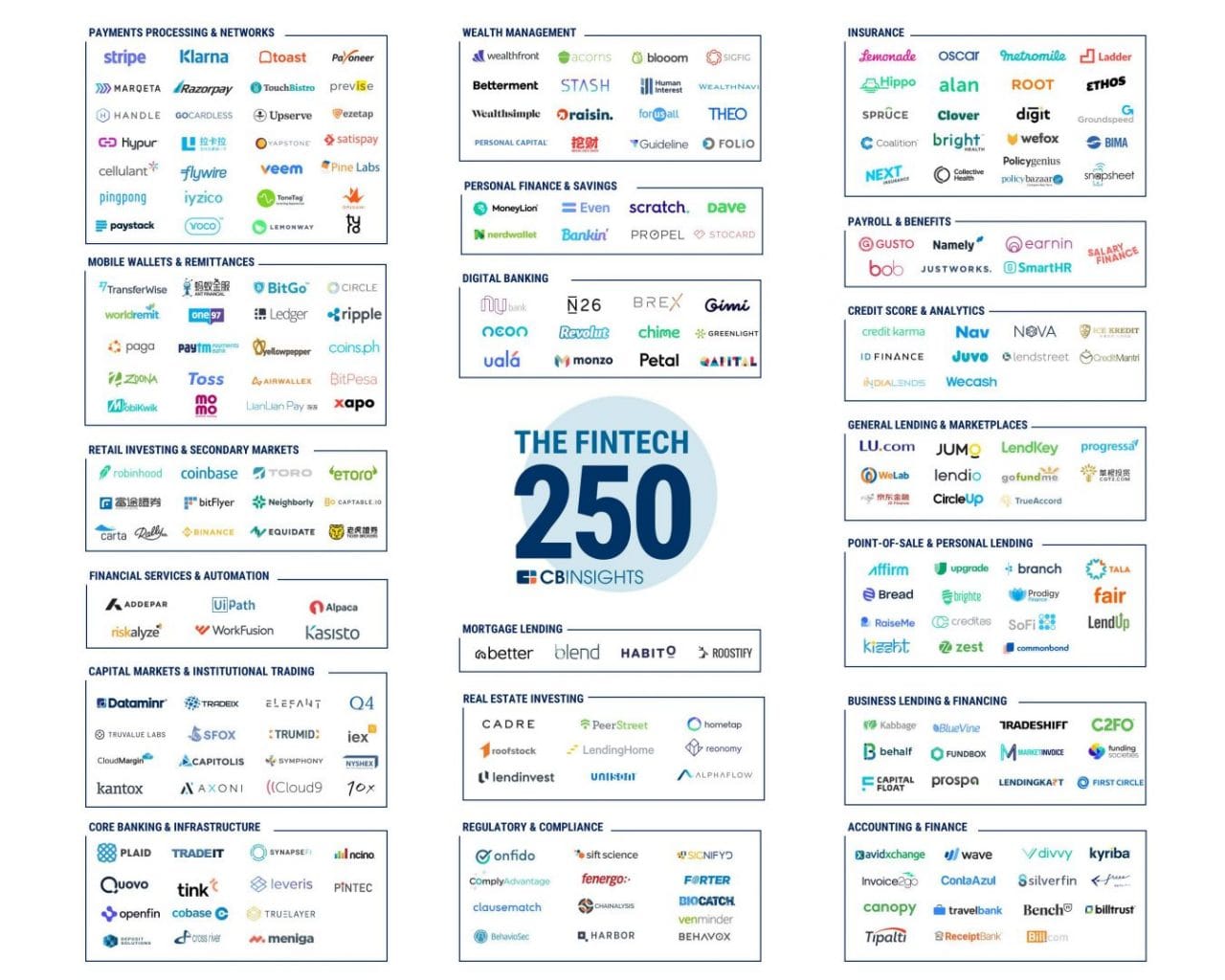
The financial services industry is being transformed by insurgent startups. From capital markets to insurance and digital banking to wealth management, the Fintech 250 are among the most promising of these companies globally. This year, moreover, has seen the consolidation of trader tools such Coinbase, eToro and other exchanges or the long-awaited take off of some cryptos, especially Ripple.
CB Insights unveiled the second annual Fintech 250 — a list of 250 of the top fintech startups applying a mix of software and technology to transform the financial services industry.
The companies were selected by CB Insights’ Intelligence Unit from a pool of nearly 4,000 applicants and nominees based on several factors, including data submitted by the companies, business model and momentum in the market, and the company’s Mosaic Score, CB Insights’ proprietary algorithm that measures the overall health and growth potential of private companies.
The 2018 Fintech 250 have raised approximately $53B in aggregate funding across 947 deals since 2013, and includes startups at different investment stages of development, from early-stage (seed/Series A) companies to well-funded unicorns.
The market map below categorizes the Fintech 250 companies based on core area of focus. Categories are not mutually exclusive. Scroll down to see a list of all the companies on the map and their associated categorization.
2018 FINTECH 250 INVESTMENT HIGHLIGHTS:
- Unicorns: 30 of the Fintech 250 companies have reached a valuation of $1B or more and are in the unicorn club.
- Funding Trends: Since 2017, these 250 private companies have raised $31.85B across 373 deals.
- Mega-rounds: From 2013 – 2018 YTD (10/16/18) there have been 83 mega-round ($100M+) equity investments to this year’s Fintech 250, with 33 of them in 2018 YTD. This year’s cohort has already seen more mega-rounds in 2018 YTD than 2017’s Fintech 250 list in all of 2017, with 23 mega-rounds investments.
- Outside the US: 44% of the 2018 Fintech 250 are based outside the US. The UK is home to the most Fintech 250 companies outside the US, followed by India.
- Top VC Investor: Ribbit Capital is the top investor in Fintech 250 companies, having backed companies on the list including new 2018 unicorns, Nubank, Revolut, and PolicyBazaar as well as returning Fintech 250 companies Robinhood, Wealthfront, Gusto, Coinbase, Cross River Bank, and Upgrade.
- Top Deal: Ant Financial raised an unprecedented $14B Series C in Q2’18 that included General Atlantic, Warburg Pincus, GIC, Sequoia Capital China, Silver Lake Partners, T. Rowe Price, Temasek Holdings, and Primavera Capital Group, among others.
- Most well-funded: Ant Financial is also the most well-funded company on the Fintech 250 list having raised approximately $19.1B across 4 investments.
SINCE THE 2017 FINTECH 250:
- 2017 vs. 2018 quick stats: 2018’s list has seen more equity investments and venture funding in 2018 than 2017’s list saw last year.
- 2017 Fintech 250: 2017’s Fintech 250 list saw 22 exits, 11 through IPO and 11 through M&A.
- Top Exits through IPO: ZhongAn Insurance IPO in Q3’17 ($11B market cap at end of first day of trading). Payments platform Adyen went public in Q2’18 at an $8.3B market cap and today has a market cap of $20B+.
- Top Acquisition: iZettle was acquired by PayPal in Q2’18 for $2.2B, more than double what the company was seeking to raise in a planned initial public offering.
- All 2017 Fintech 250 companies remain active and in operation, when our own research shows that 67% of funded startups fail or stall.
Trading platforms within the Financial technology companies keep rising and represent a thriving market. In 2019, experts forecast an even better year, with new opportunities and emerging technologies finally taking over the fintech industry, while these expand their activity to financial inclusion in emergent countries and hold their position within the more industrial countries.

Hernaldo Turrillo is a writer and author specialised in innovation, AI, DLT, SMEs, trading, investing and new trends in technology and business. He has been working for ztudium group since 2017. He is the editor of openbusinesscouncil.org, tradersdna.com, hedgethink.com, and writes regularly for intelligenthq.com, socialmediacouncil.eu. Hernaldo was born in Spain and finally settled in London, United Kingdom, after a few years of personal growth. Hernaldo finished his Journalism bachelor degree in the University of Seville, Spain, and began working as reporter in the newspaper, Europa Sur, writing about Politics and Society. He also worked as community manager and marketing advisor in Los Barrios, Spain. Innovation, technology, politics and economy are his main interests, with special focus on new trends and ethical projects. He enjoys finding himself getting lost in words, explaining what he understands from the world and helping others. Besides a journalist he is also a thinker and proactive in digital transformation strategies. Knowledge and ideas have no limits.










